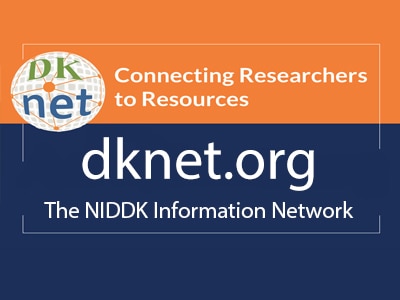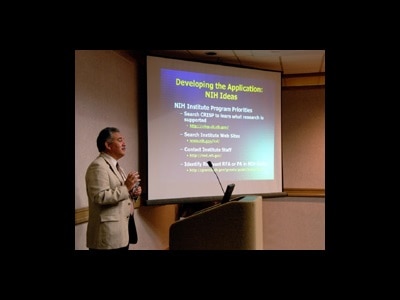Nutrition Obesity Research Centers
Resources and programs to foster interdisciplinary basic, clinical, public health research related to nutritional sciences and/or obesity.
NIDDK Program Staff
- Mary Evans, Ph.D. Multi-center Clinical Studies in Nutrition & Obesity; Nutrition Obesity Research Centers; Diet & Physical Activity Assessment Methodology
Funding for Nutrition Obesity Research Centers
NIDDK funds the Nutrition Obesity Research Centers (NORCs) via P30 awards. For required tables and documentation, please see the NORC Application Resources.
Current NORC RFA: RFA-DK-25-007
Receipt dates: October 9, 2024 and June 10, 2025
NORC Research Resource Center (RRC)—RFA-DK-25-011
Receipt date: October 9, 2024
RRC Purpose: In collaboration with the existing NORC program, the RRC will (1) provide administrative support for the entire NORC Program, (2) establish and curate a NORC Program website and centralized repository of research resources, (3) implement a multi-pronged approach to support and grow the early-to-midcareer research workforce with a goal of maximizing national outreach and impact, (4) administer and manage a NORC Opportunity Program to address gaps and promote collaboration, and (5) manage a Pilot and Feasibility Program.
Resources and Services Available from Nutrition Obesity Research Centers
Visit the centralized NORC website for detailed information about the NORCs, including research resources, and services available to the broader research community.
The NORC program supports 11 Centers providing research infrastructure, including research services, enrichment programs, and collaborative activities, at academic/medical institutions throughout the U.S. The goal of the program is to foster interdisciplinary basic, clinical, and public health research. Center programs are expected to bring together established and new investigators who are actively conducting high-quality research programs related to common nutritional sciences and/or obesity theme(s). NORCs are aimed at improving the quality and multidisciplinary nature of research in nutritional sciences and/or obesity by providing shared access to specialized technical resources and expertise. The NORC program ultimately strengthens and provides cost-effective research resources to multidisciplinary groups at institutions with an established, comprehensive research base in nutritional sciences and/or obesity and related research topics.
Nutrition Obesity Research Center at Harvard (NORCH)
- Institution: Harvard Medical School, Boston, Massachusetts
- Collaborating institution(s): Beth Israel Deaconess Medical Center, Boston, Mass.; and Massachusetts General Hospital, Boston, Mass.
- Research purpose/goals: The mission of the NORCH is to support and promote a highly productive group of researchers working in key thematic interests, to enable scientific discovery in nutrition and obesity, and to make knowledge of these discoveries available through a robust education and enrichment program. The specific goals of the NORCH are to provide accessible, high quality metabolic phenotyping services; provide access to leading edge technologies for functional imaging of metabolic pathways, tissue composition, and neural circuitry; enable access to expert consultants in bioinformatics, genomics, and cell biology; foster the advancement of junior investigators through access to pilot funding, statistical guidance, and education in nutrition and obesity; and increase communication and collaboration within our community of investigators, and disseminate research results to the larger public and scientific communities.
- List of cores:
- Genomics and Cell Biology Core
- Metabolic Imaging Core
- Metabolic Phenotyping Core
- Pilot and Feasibility Program
New York Nutrition Obesity Research Center
- Parent institution: Columbia University, New York City, New York
- Collaborating Institution: Albert Einstein College of Medicine, New York City, New York
- Research purpose/goals: The New York Obesity Nutrition Research Center (NYNORC) provides a nexus of basic and translational research in obesity and its allied disorders that is explicitly designed to promote close collaborations of research scientists and clinicians. The Center is closely integrated with all the relevant technical, intellectual and clinical resources of two major medical centers -Columbia University Irving Medical Center and the Albert Einstein College of Medicine - and has a long history of achievement in nearly all areas of obesity research and clinical care. The scientific focus and current scientific efforts of the Center’s investigators are organized around six themes: (1) the etiology of obesity; (2) the physiology of weight regulation and nutrient use; (3) the pathophysiology and complications of obesity; (4) treatment and prevention strategies for obesity; (5) development of new tools and strategies for the study of nutrition and obesity; (6) and the training and development of scientists to study obesity.
- List of cores:
- Animal Phenotyping Core (Albert Einstein College of Medicine)
- Molecular Biology/Molecular Genetics (Columbia University)
- Human Phenotyping (Columbia University)
- Pilot and Feasibility Program
- Parent Institution: University of Colorado Anschutz Medical Campus, Aurora, Colorado
- Collaborating Intuitions: Colorado State University (CSU); Boulder, CO; University of Colorado Boulder, Boulder CO; University of Colorado Denver, Denver, CO; University of Kansas Medical Center, Kansas City, KS.
- Research purpose/goals: The mission of the Colorado NORC is to advance the science of nutrition and obesity by facilitating interdisciplinary, collaborative, translational research and by fostering the development of the next generation of scientists in the Rocky Mountain region. The central theme of the Colorado NORC is the prevention and treatment of obesity and its metabolic complications across the lifespan, through better nutrition, lifestyle modifications, and medical treatments.
- List of cores:
- Clinical Intervention and Translation Core
- Energy Balance Assessment Core
- Molecular and Cellular Analytic Core
- Pilot and Feasibility Program
Michigan Nutrition and Obesity Research Center (MNORC)
- Institution: University of Michigan, Ann Arbor, Michigan
- Research purpose/goals: The mission of the Michigan Nutrition Obesity Center (MNORC) is to provide researchers with infrastructure, expertise, and training to integrate, analyze, and model data from properly designed basic, clinical, and population-based studies in obesity and metabolism-related diseases with a goal to identify better ways for prevention and treatment of obesity.
- List of cores:
- Weight Management Program
- Childhood Obesity Research Core
- Adipose Tissue Core
- Nutrition, Exercise and phenotype Testing (NExT) Core
- Molecular Phenotyping Core
- Pilot and Feasibility Program
- Parent Institution: Pennington Biomedical Baton Rouge, Louisiana
- Collaborating Institutions: Louisiana State University A&M, Baton Rouge, Louisiana; Tulane University, New Orleans, Louisiana; Louisiana State University Health Sciences Center, New Orleans, Louisiana; Ochsner Health Louisiana, Baton Rouge, Louisiana; Xavier University, New Orleans, Louisiana
- Research purpose/goals: Over the years, the Pennington/Louisiana NORC conducts research covering the biological and environmental determinants of the energy balance equation as well as the relationship between obesity and cardio-metabolic health. Our vision emphasizes the general theme of nutrition and metabolic health through the lifespanwith emphasis on mechanisms, prevention, and treatment modalities at each step of the lifespan. The collective research base is related to the metabolic impact of nutrition on health and diseases.
- Cores:
- Human Phenotyping Core
- Molecular Mechanisms Core
- Animal Core
- Pilot and Feasibility Program
University of Alabama at Birmingham (UAB) NORC
- Institution: University of Alabama at Birmingham, Birmingham, Alabama
- Research purpose/goals: The UAB NORC is a university-wide interdisciplinary research center established to foster a multidisciplinary approach to basic, clinical, and translational research and research training with an emphasis on understanding the causal factors underlying nutrition and obesity-related health problems and the generation and evaluation on their consequences, prevention, and alleviation.
- List of cores:
- Behavioral Science and Analytics Core
- Animal Models Core
- Metabolism Core
- Pilot and Feasibility Program
University of California San Francisco NORC
- Institution: University of San Francisco, San Francisco, California
- Research purpose/goals: The purpose of the UCSF-NORC is to promote and grow research in obesity, nutrition, and metabolism at UCSF and throughout northern California. This is realized by maintaining, improving, and promoting the interactions and collaborations of researchers in the field with each other and with those outside the field; supporting the maintenance and evolution of state-of-the-art Research Cores to meet the needs of obesity, nutrition, and metabolism research; facilitating the development of new research directions and the entry of new researchers into the field via Pilot & Feasibility opportunities; enriching the NORC research community through pertinent educational forums and other venues that support the development and maintenance of research interactions; and integrating administrative support to ensure that the infrastructure meets the needs of the local obesity, nutrition and metabolism research community.
- Cores:
- Human Metabolism Core
- Mouse Metabolism and Imaging Core
- Genetics and Genomics Core
- Pilot and Feasibility Program
University of North Carolina Nutrition Obesity Research Center
- Institution: The University of North Carolina at Chapel Hill, Chapel Hill, NC
- Research purpose/goals: Since the UNC NORC’s inception in 1999, the Center has facilitated the development and transfer of cutting-edge research from the laboratory to the general public for a wide range of research studies. The goals of the UNC NORC are to provide resources and support to investigators conducting multidisciplinary and interdisciplinary research in nutritional sciences and obesity; enhance the impact and presence of nutrition and obesity research at UNC; strengthen clinical nutrition training programs for medical students, practicing physicians, and allied health personnel; and translate findings from obesity and nutrition research to the general public to improve their overall health and well-being.
- List of cores:
- Animal Metabolism Phenotyping Core
- Clinical and Community Human Assessment and Interventions Core
- Metabolism and Metabolomics Core
- Precision Nutrition Core
- Pilot and Feasibility Program
University of Texas Southwestern Nutrition Obesity Research Center
- Institution: University of Texas Southwestern Medical Center, Dallas, Texas
- Research purpose/goals: The purpose of the UT-Southwestern NORC is to provide the infrastructure to support, facilitate, and advance studies in nutrition, obesity, and metabolic syndrome; to develop the next generation of nutrition and obesity researchers; to establish Interdisciplinary research teams to create dialogue and support collaborations to support translation of basic scientific findings to humans; and to effectively communicate these advances to the public.
- List of cores:
- Animal Phenotyping/Metabolism Core
- Lipid Mass Spectrometry Core
- Quantitative Metabolism and Imaging Core
- Genetics, Single-Cell Sequencing, and RNA Sequencing Core
- Pilot and Feasibility Program
University of Washington Nutrition and Obesity Research Center (UW NORC)
- Institution: University of Washington & Fred Hutchinson Cancer Center; Seattle, Washington
- Research purpose/goals: The University of Washington Nutrition and Obesity Research Center’s overarching goal is to support basic, clinical, and translational research at UW related to nutrition, obesity, and related metabolic disturbances. The aims are to offer a balanced array of services in support of research in nutrition and obesity in a manner that evolves to meet the specific needs of our investigators; to advance science by offering, optimizing, and individualizing services that otherwise would be either unavailable to or not cost-effective for the local nutrition and obesity research community; and to proactively support collaboration within, and the educational enrichment of, the local nutrition and obesity research community.
- List of cores:
- Analytic Core
- Clinical and Translational Research Services Core
- Energy Balance Core
- Biostatistics Sub-core
- Discovery Metabolomics Sub-core
- Pilot and Feasibility Program
Washington University Nutrition Obesity Research Center
- Institution: Washington University School of Medicine, Saint Louis, Missouri
- Research purpose/goals: The Washington University NORC seeks to stimulate new and innovative nutrition and obesity research and attract new investigators to the field of nutrition and obesity by supporting collaborative research among investigators from different disciplines and in different Washington University schools, departments, and divisions. It also strives to improve the training and education of students, house staff, postdoctoral research fellows, physician faculty, and allied health personnel in clinical nutrition, obesity medicine, and nutrition/obesity research; and to enrich nutritional aspects of patient care by enhancing clinical nutrition services and improving physician and healthcare provider knowledge of nutrition.
- List of cores:
- Cellular and Molecular Biology Core
- Animal Model Research Core
- Clinical Science Research Core
- Dissemination and Implementation Science Core
- Pilot and Feasibility Program
Related Links
-
View related clinical trials from ClinicalTrials.gov.
-
Study sections conduct initial peer review of applications in a designated scientific area. Visit the NIH’s Center for Scientific Review website to search for study sections.
Research Resources
NIDDK makes publicly supported resources, data sets, and studies available to researchers to accelerate the rate and lower the cost of new discoveries.
- Ancillary Studies to Major Ongoing Clinical Studies to extend our knowledge of the diseases being studied by the parent study investigators under a defined protocol or to study diseases and conditions not within the original scope of the parent study but within the mission of the NIDDK.
- NIDDK Central Repository for access to clinical resources including data and biospecimens from NIDDK-funded studies.
- NIDDK Information Network (dkNET) for simultaneous search of digital resources, including multiple datasets and biomedical resources relevant to the mission of the NIDDK.
Additional Research Programs
Research Training

NIDDK supports the training and career development of medical and graduate students, postdoctoral fellows, and physician scientists through institutional and individual grants.
Learn about NIDDK Research Training ProgramsSmall Business
Small Business Programs
NIDDK participates in the Small Business Innovation Research (SBIR) and Small Business Technology Transfer (STTR) programs. These programs support innovative research conducted by small businesses that has the potential for commercialization.
Learn about NIDDK Small Business ProgramsHuman Subjects Research
Human Subjects Research
NIDDK provides funding for pivotal clinical research, from preliminary clinical feasibility to large multi-center studies.
Learn about Human Subjects ResearchTranslational Research

NIDDK provides funding opportunities and resources to encourage translation of basic discoveries into novel therapeutics.
Learn about NIDDK Translational Research Opportunities-
NIH Common Fund
Learn about current projects and view funding opportunities sponsored by the NIH Common Fund.
-
Planning to Apply? Register Early
Registration is required at eRA Commons and grants.gov and can take 4 weeks.





